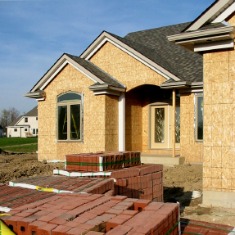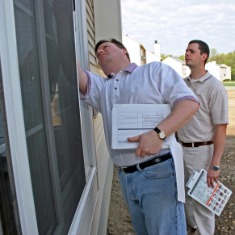Author Archive

How Do Mortgage Companies Value A Property That Has Not Been Built Yet?
The task of determining the value on new construction projects does pose some challenges. There may not be comparables that ideally represent your home.
Appraisals on homes that haven’t been built or are under construction generally require the contractor and home buyer to supply more documentation in order to get a more accurate estimate of the property’s value.
For some, building a new home can be both exciting and overwhelming.... Continue Reading >

Hazard Insurance [incity]
Hazard Insurance can be a great thing to have for many homeowners, as it does protect homeowners against damages that may be caused by fires, severe storms, earthquakes or other natural disasters that could hit home.
Mother nature is unpredictable, and it is wise to expect the unexpected a lot of times, especially when it boils down to a person's investment. You can never be too prepared!
[state] Hazard Insurance Overview
To attain a Hazard Insurance for a... Continue Reading >

A deficiency judgement is where the mortgage lender files in court to require the borrower pay them the difference between what they owed on their mortgage and what the property sold for in a short sale or a foreclosure.
The deficiency amount varies but can be a very significant amount of money, even hundreds of thousands of dollars if your [state] short sale is not properly negotiated.
The deficiency judgment is the difference of the loan amount as well as... Continue Reading >

Is It Better To Short Sale or Foreclose On Your [city] Property?
Whether you have fallen behind on your mortgage payments, are attempting to negotiate a loan modification with your lender or contemplating a strategic default, the ultimate goal should be to find a solution other than foreclosure.
In most instances, Servicers and Lenders do not want to foreclose on delinquent borrowers as the first option due to the amount of time and money that they may potentially lose going through the... Continue Reading >

Understanding the Difference Between an Appraisal vs Neighborhood Listing Prices
Appraisals [incity] are meant to be a realistic determination of the value of a home if it were to sell in the current market, in its current condition.
Why is there such a difference between the appraised value of my home and the listing price of my neighbors home?
This is a great question, and you don’t have to be a mortgage professional or a real estate agent to understand the answer. The... Continue Reading >

Five Myths About Home Values
When home values are going up, most homeowners do not question appraisals.
When property values are declining, home sellers and even listing agents quite often question and pick apart appraisals.
However, the actual appraisal process changed very little over the course of the housing boom and bust cycle American homeowners witnessed between 2001 – 2009.
Since the topic of home values seems to be a hot discussion, let’s address the top five appraisal myths.
Appraisal Myths / Questions:
“I just put... Continue Reading >

What You Need To Know About The Home Inspection Process [incity]
Congratulations on finding a house [incity]!
Once the seller accepts your offer “Time is of the Essence”. Depending on your purchase contract you now have only a few days from when you signed the purchase and sales agreement to have a home inspection.
Typically, your real estate agent made the offer contingent upon a satisfactory home inspection and obtaining mortgage financing. Communication with your real estate agent is key. Ask about your... Continue Reading >

HOA Hurdles to be Aware of When Looking at New Properties
A Home Owner Association (HOA) can have a huge impact on your life when you buy a home in a PUD (Planned Unit Development) or Condominium Project.
According to Wikipedia:
"A homeowners’ association (abbrev. HOA) is an organization created by a real estate developer for the purpose of developing, managing and selling a development of homes.
It allows the developer to exit financial and legal responsibility of the community, typically by transferring ownership... Continue Reading >

Important Factors To Consider When Getting Financing On A Foreclosure, Short Sale or New Construction
When purchasing a foreclosure, short sale or new construction home [incity] it is important to understand they each have their own unique factors that can affect financing.
If the guidelines and potential pitfalls are not properly understood, you could face delays in closing or, worst case scenario, a denied loan.
Having an open line of communication with your mortgage professional will help you successfully navigate through the purchase... Continue Reading >

Where Does My Earnest Money Go?
A basic and very obvious question that most first-time [city] home buyers ask once their purchase contract gets accepted.
When a buyer makes an offer to buy residential real estate, he/she generally signs a contract and pays a sum acceptable to the seller by way of an Earnest Money Deposit or Good-Faith Deposit.
An Earnest Money Deposit (EMD) is simply held according to the terms of the executed purchase contract.
Earnest Money Deposit (EMD)
The amount varies... Continue Reading >
















